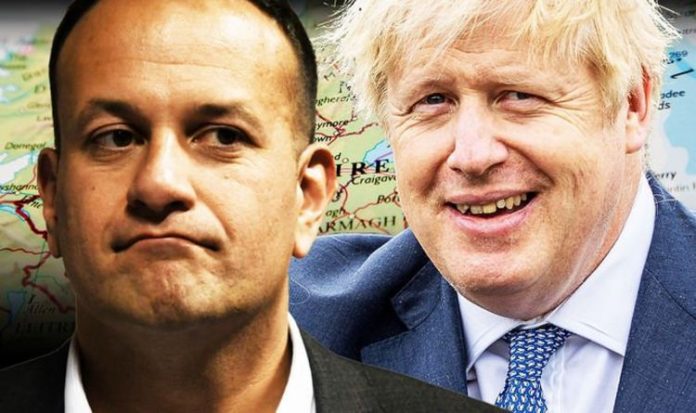Brexit negotiations are getting increasingly tense, especially after Downing Street hit out at the EU for “unnecessarily difficult” trade discussions. Both sides are laying the blame at the other sides’ feet — and the pressure to find a deal is mounting as the end of the transition period, December 31, draws closer. Although Express.co.uk readers have urged Prime Minister Boris Johnson and chief UK negotiator David Frost to walk away, Ireland has pleaded with the two sides to hash it out.
The Emerald Isle is set to suffer most in the event of a no deal Brexit. Still, the Northern Ireland Protocol was established last year to lessen the impact on the Irish border.
The regulation means Northern Ireland will have to stick to the rules of the EU’s single market and customs union, to maintain smooth trade with the Republic.
Yet, the Northern Ireland executive will not be able to have a say in the governance of the EU markets because, like the rest of the UK, it will officially leave the bloc at the end of this year
However, while it may prevent a hard border between Northern Ireland and the Republic, the Protocol may actually have created an indefinite tie to the EU.
According to the Institute for Government, “UK authorities will be responsible for implementing EU law in this area” and “it will remain subject to the European Court of Justice”.
The non-profit organisation added that the Protocol aims to “avoid the introduction of a hard border on the island of Ireland in the event that there is a no deal Brexit”.
READ MORE: Boris Johnson warned ‘unsustainable plan will handicap Brexit Britain’
As the LSE blog pointed out when Mr Johnson negotiated the Northern Ireland Protocol with then Taoiseach Leo Varadkar last year, this means the “jurisdiction of the Court of Justice of the European Union” is the “legal default” following the transition period.
Brexit research fellow Oliver Garner explained: “The new content means that this jurisdiction would apply to UK authorities acting on UK territory.
“The creation of a new legal test for when EU law will apply in and to the UK in relation to the movement of goods between Great Britain and Northern Ireland means there may be a higher likelihood of this jurisdiction being required.”
This jurisdiction could only be terminated if the Northern Ireland Assembly refused to consent to the Protocol’s renewal when it votes every four years on the arrangements — a key element which was written into the Protocol to ensure Stormont could give its consent.
Mr Garner added: “The second method is a future relations agreement coming into force which supersedes the Protocol.
“This could seek explicitly to supersede the jurisdiction of the CJEU [Court of Justice of the EU].”
Additionally, the UK will have to check goods movements against the criteria established by the Joint Committee between Britain and the EU.
Mr Garner added that “continuing jurisdiction” from the EU will become the “default rather than the fall-back” following the transition period’s end.







